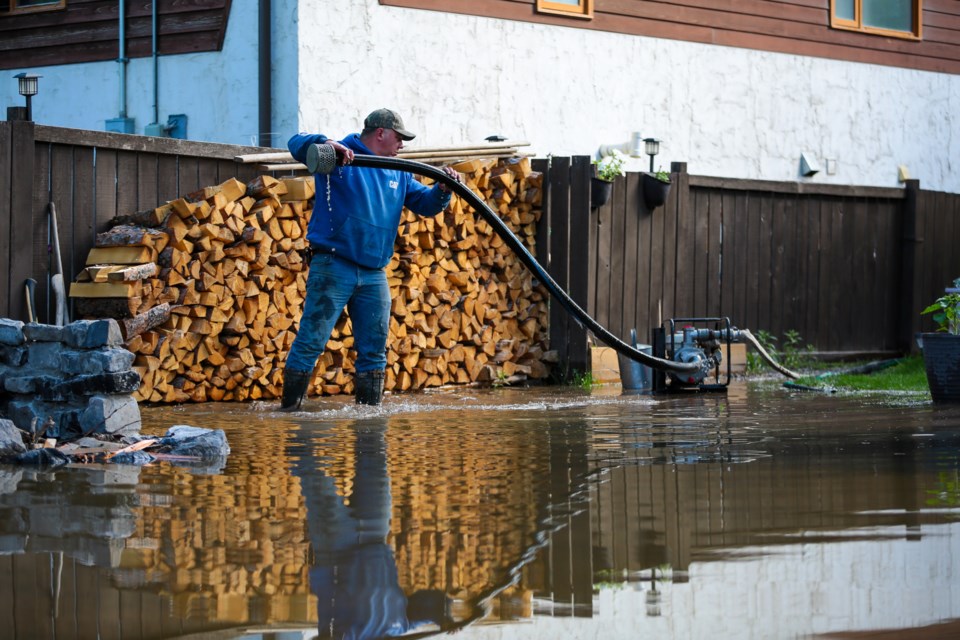BIGHORN – A provincial report is linking rainfall and snowmelt to groundwater flooding experienced by Exshaw residents earlier this year.
In an Alberta Emergency Management Agency (AEMA) report presented to Bighorn council last week, the assessor said the Exshaw debris structure was "most likely" not the cause.
"Large scale channelization on Exshaw Creek was recently completed to mitigate surface flooding. Many affected residents feel that these works contributed to this year's flooding. My contacts and observations seem to indicate these works most likely did not contribute to this year's groundwater intrusion," the provincial assessment presented by AEMA read.
In the information report put together by Bighorn Chief Administrative Officer Rob Ellis, he notes the assessor linked the groundwater flooding to rainfall and snowmelt events.
"The report noted the snowpack was in the upper quartile in 2019-20," Ellis wrote.
Several homes in the east end of Exshaw were unexpectedly flooded with high groundwater in June. Residents spent weeks pumping thousands of litres out of their basements with reports of up to 50 centimetres of groundwater in homes.
At the time, many Exshaw residents voiced concerns about the recently completed flood mitigation work nearby on Exshaw Creek as a suspect for the flooding. The same week, the MD of Bighorn hired an independent hydrogeologist to study the groundwater flooding.
The MD asked the hydrogeologist to investigate:
• What caused the unusually high groundwater levels in east Exshaw?
• Is the Exshaw Creek flood mitigation structure a cause of the high groundwater levels?
• What could be done to mitigate the groundwater problem?
• What would be the estimated cost of this mitigation?
During the September council meeting, Ellis said there was a delay in the report because extra information was needed.
"We are waiting for an interim report to be presented," Ellis said during the virtual Sept. 8 meeting. An update is expected at the Oct. 13 council meeting.
BIGHORN APPROVED $50k
In the meantime, council has been focusing on how to help the residents affected by the groundwater flooding.
In May, council approved the 2020 Tax Rate bylaw, which included a 2.8 per cent decrease in the municipal residential tax rate and the 2.3 per cent decrease in the non-residential municipal tax rate.
The MD also applied for the province's Disaster Recovery Program (DRP), in the hopes of helping residents recover costs from uninsurable damage.
The application was recently denied. In the decision, Alberta Municipal Affairs outlined the specific criteria for funding assistance to be approved, which included the cause of the disaster to be extraordinary and cause widespread damage, the disaster threatened the economic viability of the community and if the damages are not insurable.
"After careful review, we have determined this event was not extraordinary or widespread in nature. The overland flooding due to the groundwater aquifer did not exceed the one in 50-year return to be considered an extraordinary event," Shane Schreiber, managing director for Alberta Emergency Management Agency (AEMA) wrote in a Sept. 25 letter.
However, given the unique circumstances, the governing agency approved the creation of a localized program with a budget up to $50,000 to support community response and evacuation costs.
"We were found not to conform to the policy requirements," Bighorn Reeve Dene Cooper said.
"The government looked at the municipal application and granted $50,000 to the municipality to cover the municipal costs, which is about in the neighbourhood of about 40 per cent of expenditures – so it covered some of our costs, but not all of our costs."
A special meeting was called on Oct. 1 to review the letter. Council requested further clarification if there was coverage for residents affected by groundwater flooding.
"Without meeting the DRP eligibility criteria, there is no financial support for the residents of east Exshaw affected by groundwater flooding," Ellis wrote in the information report.
Cooper said the MD is still looking into options to help residents affected, including considering applications for tax relief.
"We have been alongside and supporting the collective needs of the residents," Cooper said.




